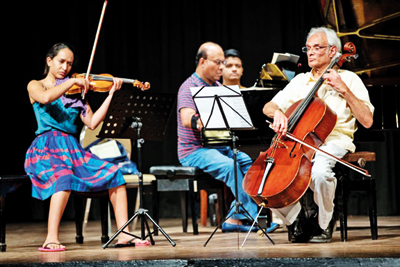A classical trio, a concert to delight
View(s):
The trio at practice at the Wendt. Pic courtesy Sunera Foundation
The Trio, comprising well-known and recognized performers, all of them with ties that bind them with Sri Lanka, with years of experience on the concert stages of the world and totally adjusted to appearing before audiences of all sorts, were in Colombo to perform for the Sunera Foundation at the Lionel Wendt Memorial Theatre, on March 27. The bill of fare was very much rooted in the 19th century ethos, and included, by and large, the First Viennese School of composers, with early Beethoven, Schubert and Brahms……and an encore, which was again in that same vein, a zesty vignette from Haydn. So, what would you expect from seasoned and accomplished players like these? Perfection?
Perhaps. Thankfully and notably though, the audience was treated to a ‘musical’ interpretation of compositions that have been heard for years, and recorded repeatedly by many many players from all over the world. The delight was in being ushered within the realm of a creative impress, and not a facile reading of familiar scores.
Mandhira de Saram’s self-assured presence as a violinist worthy of the name, was palpably evident; and this one can appreciate the more, being privy to the development of her artistry over the years when she has, from time to time been on the concert stage in Sri Lanka, and her trajectory as a performer has been plain to see.
For Mandhira this was a first time, collaborating with the renowned pianist Rohan De Silva. For the Lankan audience too, it was a first to hear her performing on the same stage as cellist Rohan de Saram. They have performed together away from Sri Lanka a few times already. However, Rohan de Saram and Rohan the pianist have played before this date, at a previous fundraiser concert for Sunera in Colombo.
The evening’s tour de force was Brahms’ Piano Trio in B major Opus 8, which is about 40 minutes in performance. In particular the Scherzo (the 2nd movement) brought to the fore the maturity and artistry of the players. In chamber music of this sort, the awareness of each performer of the others in the trio, the parts they contribute with the expression and the finesse in dynamics brought to bear in the execution, matter ever so much. The Piano is the lead instrument, and there is much dramatic intensity that the composer has included, even as there are contrasting themes within the movement. It starts with a lively skipping minor theme, and then metamorphoses into a major key and an exciting level of exuberance, even as there appear some more startling departures in a different direction before ending in a very quiet and very controlled closing phrase. I found brilliance in this rendition at this concert. The pianist was note-perfect, and Rohan De Silva can be relied on to deliver that level of exactitude, and, in the context of the trio, the violin and cello complemented each other and wove their magic as appropriate for the writing for Brahms’ piano. The following Adagio was of a mysterioso quality, at times dark and sonorous, but with an amazing delineation of musical ideas, meditative, calming, and overall, demanding of discerning musical interpretation, which, again, was a delight to observe and relish.
In contrast, the opening work at the concert,a Piano Trio by Beethoven, a single movement piece in a sort of sonata form,marked Allegretto, from early in his career, was almost ‘light’ (Mozartian), though not frivolous or overly simple. Mandhira explained to the audience that Beethoven wrote this for a young girl of ten (who had once poured cold water on the composer’s head!). Although the theme is straightforward and simple there is much for the piano with impressive scales and soaring sections, which bespeak levels of sophistication and demands some articulated pianistic skill.
The third of the works and second in order of presentation at the concert, was Schubert’s Piano Trio No. 1 in B flat major, Opus 99. This too was an exciting and probably exhausting work to perform. The interplay among the musicians and the exploiting of the different textures in sound makes this a work that one wishes to listen to repeatedly to be able to savour those elements and contrasts. The fourth movement Rondo- Allegro vivace was performed with full cognizance of the gaiety as well as the crafted, lilting lyricism that one associates with Schubert.
It would appear that audiences in Sri Lanka are destined to remain ensconced in the mouldy folds of nineteenth century musical compositions, even as these well-recognized and recognizable works by well-known composers are repeatedly brought before them at concerts. One would have expected that given the amazingly vibrant contributions offered the world of contemporary music by two of the present trio, both Mandhira and Rohan de Saram, we might have been offered the opportunity to hear and observe them in the performance of new music that is very much the oeuvre they serve in their professional work, in the concert arena of Europe. This exciting ‘frontier’ is absent in Sri Lanka or still out of reach, despite the examination syllabi actually featuring the theory and performance of moderns. Here was a capital opportunity lost, to actually listen to the pros that can play with credibility and expertise!
-Arun Dias Bandaranaike


